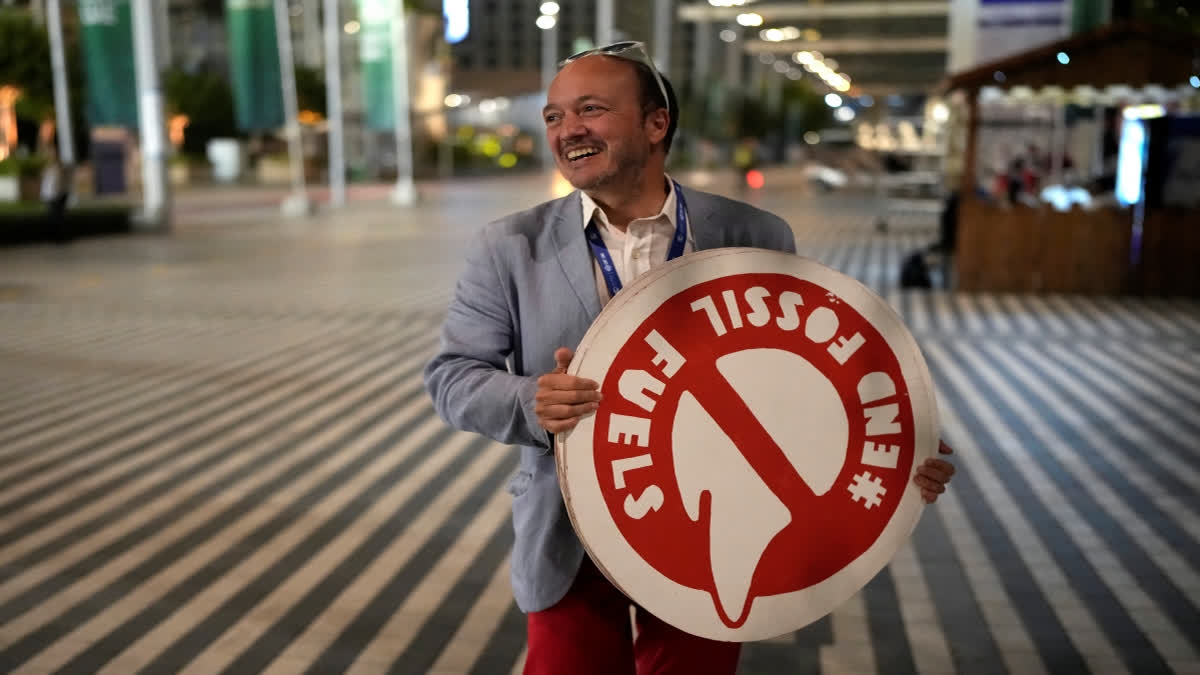Dubai (United Arab Emirates): A new compromise floated early Wednesday at United Nations COP28 climate talks called for the world to eventually wean itself off planet-warming fossil fuels in a global rallying cry stronger than proposed days earlier.
The new proposal doesn't specifically use the language of calling for a "phase-out" of fossil fuels, which more than 100 nations had pleaded for. Instead, it calls for "transitioning away from fossil fuels in energy systems, in a just, orderly and equitable manner, accelerating action in this critical decade." The transition would be in a way that gets the world to net zero greenhouse gas emissions in 2050 and follows the dictates of climate science. It projects a world peaking its ever-growing carbon pollution by the year 2025 to reach its agreed upon threshold, but gives wiggle room to individual nations like China to peak later.
Intensive sessions with all sorts of delegates went well into the small hours of Wednesday morning after the conference presidency's initial document angered many countries by avoiding decisive calls for action on curbing warming. Then, the United Arab Emirates-led presidency presented delegates from nearly 200 nations a new central document — called the global stocktake — just after sunrise.
It's the third version presented in about two weeks and the word "oil" does not appear anywhere in the 21-page document. It mentions "fossil fuels" twice, but Alden Meyer, a veteran climate negotiations analyst at the European think-tank E3G said that if approved it would be somewhat of a first mention of fossil fuels in context of getting rid of them.
The aim of the global stocktake is to help nations align their national climate plans with the 2015 Paris agreement that calls to limit warming to 1.5 degrees Celsius (2.7 degrees Fahrenheit). Earth is on its way to smashing the record for hottest year, endangering human health and leading to ever more costly and deadly extreme weather.
Nations were given a few hours to look at what COP28 President Sultan al-Jaber and his team produced. They'll then meet in a session that could lead to the text's adoption or could send negotiators back for more work.
Some of the language in previous versions of the draft that most upset nations calling for dramatic action to address climate change was altered. Actions that had previously been presented as an optional "could" changed to a bit more directing "calls on parties to."
After a quick de-brief, Union of Concerned Scientists climate and energy policy director Rachel Cleetus said it was "definitely an improvement" over earlier versions that environmental advocacy groups like hers massively criticized.
Other documents presented before sunrise Wednesday addressed, somewhat, the sticky issues of money to help poorer nations adapt to global warming and emit less carbon, as well as how countries should adapt to a warming climate. Many financial issues are supposed to be hammered out over the next two years at upcoming climate conferences in Azerbaijan and Brazil. The United Nations Environment Programme estimates that developing nations need $194-366 billion per year to help adapt to a warmer and wilder world.
"Overall, I think this is a stronger text than the prior versions we have seen," said U.N. Foundation senior adaptation adviser Cristina Rumbaitis del Rio. "But it falls short in mobilizing the financing needed to meet those targets."
"If we can't agree on a strong signal on adaptation, where do we go from here?" said Emilie Beauchamp of the International Institute for Sustainable Development, adding that the text on adaptation didn't meet its goal. "Instead adaptation has been relegated to the broom closet of these negotiations."
The annual conference was supposed to end Tuesday after nearly two weeks of work and speech-making. Instead, negotiators were in closed meetings as they reworked the cornerstone document that flopped a day earlier.
Oil, gas and coal are the major drivers of warming and activists, experts and many nations argued that aggressively curbing fossil fuels is critical to limit warming.
The key for the summit is finding language that won't make someone block a deal because a final agreement has to be by consensus. But consensus doesn't require unanimity, and past climate summits have pushed through an agreement over the objections of a nation or two, climate negotiations historian Joanna Depledge of Cambridge University said.
"Overruling is not impossible, just politically very, very risky," she said.



